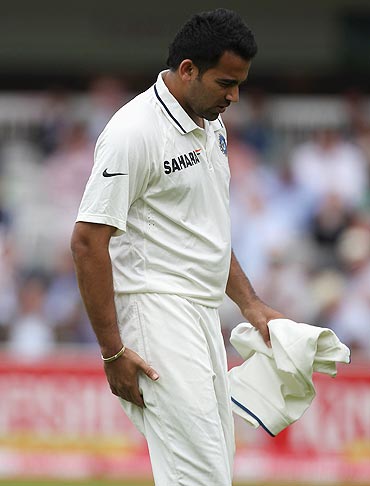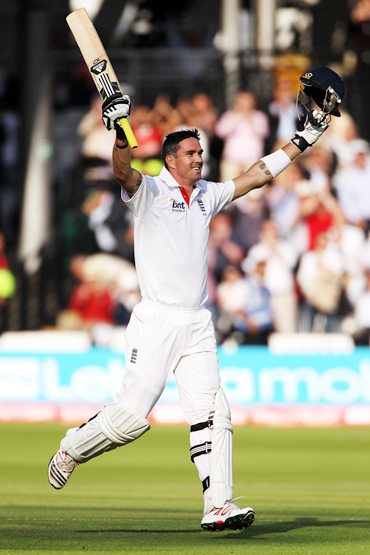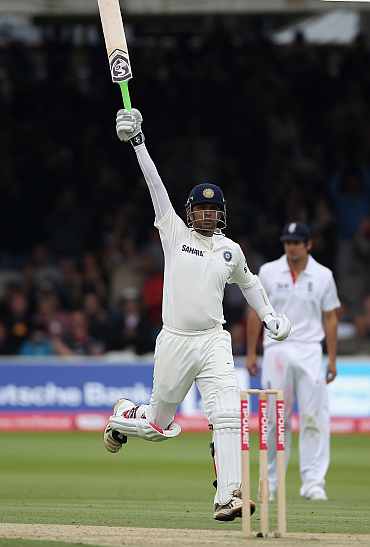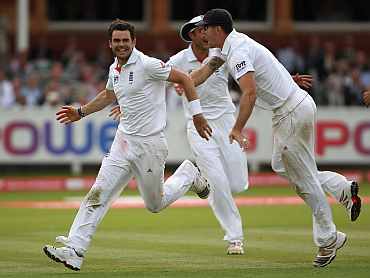 | « Back to article | Print this article |
The turning points at Lord's
Bikash Mohapatra, who watched the Lord's Test, identifies the turning points in the game.
It has to be Zaheer Khan's going off the field in the 40th over. When he left the ground, his figures were impressive: 13.3 overs, 8 maidens, a mere 18 runs and 2 wickets.
In the last ball of his sixth over, he trapped Alastair Cook -- the English star during the Ashes tour in Australia -- plumb in front.
Then, in the fourth over after lunch, he had his bunny, Andrew Strauss, caught by Ishant Sharma at fine-leg. It was the sixth time that Zaheer had accounted for the England captain.
M S Dhoni brought back Zaheer for his third spell in the 38th over. It was the first time in the match that Zaheer had bowled from the Pavilion End, having bowled his earlier spells from the Nursery End.
Zak would have had Jonathan Trott (then on 32) too, but an edge flew between Dhoni and Rahul Dravid to the fence. The boundary was the first runs in 34 balls off Zaheer's bowling.
Zak could bowl only three balls in his next over before leaving the field with a pulled hamstring. That allowed England to claw back into the game.
Day 2: Pietersen's double put England in command
The 326-ball 202*, inclusive of 21 hits to the fence and one over it, was the 31-year-old's first double century against India (his third overall).
KP was involved in four substantial partnerships that helped the English cause -- the 98-run third-wicket stand with Jonathan Trott (70); the 110-run fourth wicket stand with Ian Bell (45); the 120 runs for the sixth wicket with Matt Prior (74); the quickfire 61 in partnership with Graeme Swann (24) for the eighth.
KP's final 50 runs came off just 25 balls, underlining his dominance of the Indian bowling attack.
Day 3: Dravid to India's rescue, yet again
With the top Indian batsmen -- Sachin Tendulkar included -- failing to make runs on a classic Lord's wicket, The Wall rescued India, yet again.
His 103 not out highlighted the patience and resilience that has come to mark his illustrious career. The 220-ball elegant knock had 15 hits to the fence.
Fifteen years ago, in his debut Test, Dravid had fallen five short of a century at Lord's. He made up this time, perhaps the last time Lord's will see the great man in a Test.
It was Dravid's 33rd Test hundred, his seventh against England, the most he has scored against any nation.
When he was on 50, Dravid became the second highest scorer in Test cricket, surpassing Ricky Ponting (12,363 runs). Only Tendulkar has scored more Test runs (14,726).
Day 4: Prior's ton boosts England
Matt Prior's 103 not out was equal to Rahul Dravid's similar century not only numerically, but also in the way it rescued his side.
When the English wicket-keeper came into bat, England were on the ropes, tottering after a magnificent Ishant Sharma spell.
When Prior hit a boundary to reach his hundred, England were way ahead, having declared their second innings at 269 for six, setting India an improbable 458 to win.
The 29-year-old's 120-ball ton, with five fours and one six, was his sixth Test hundred, his first against India.
Joining Prior at 107 for 6, Stuart Broad -- the leading wicket-taker (four wickets) in the Indian first innings -- scored an attacking 74 not out, boosting his already impressive record at Lord's, where he scored a century against Pakistan last year.
The 25-year-old's seventh Test half century was made in 90 balls with nine boundaries.
Prior and Broad's 162-run partnership also set up England's highest seventh wicket stand against India.
Day 5: Jimmy Anderson's triumph
Three batsmen, who could have saved the game, returned to the hut, disappointing their billion fans.
A momentary lapse of concentration saw Rahul Dravid fishing at a wide delivery from James Anderson; Matt Prior made no mistake.
'Jammy' Dravid's reaction was instant -- he slammed his bat to the ground, his frustration evident.
Dravid's dismissal brought to an end his 75-run partnership for the second wicket with V V S Laxman.
Anderson replaced Stuart Broad in the 48th over and struck first ball; Laxman meekly holing out to Ian Bell at midwicket. What a poor stroke from the man who has fought back from the cusp of defeat time and time again!
In the very next over, Graham Swann had Gautam Gambhir, the architect of India's great fightback against New Zealand at Napier two years ago, leg before.
The visitors were 142 for four at lunch. And though they had Sachin Tendulkar and Mahendra Singh Dhoni still, the battle was lost.




